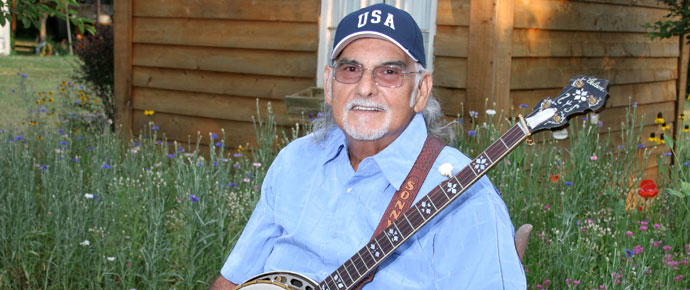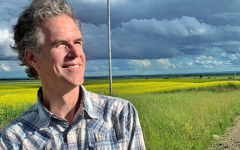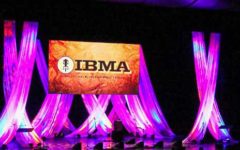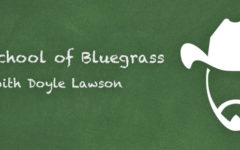
Well Chief, it’s hard to believe, but this is Ask Sonny #99. Next week will mark the 100th column since we began this little journey nearly two years ago. I think congratulations are in order, so to everyone reading this, be sure to send in a personal note to Sonny next week for the big milestone article.
Terry
===========
Sonny, I’ve always a big fan of you and Bobby, and I miss you together on stage. I look forward to Bobby returning to touring when the pandemic is behind us. As for my question, I wasn’t surprised that George Morgan was nice to him. We knew Jimmy C. Newman, and he talked about how Morgan put him at ease when he was nervous about joining the Opry. I was disappointed in Billy Grammer, but I wondered if Grammer might have thought it was funny because Morgan had the reputation for being a major practical joker. So I wondered if George ever “got” the Osbornes, or if there were other practical jokes or jokers around the Opry he would like to tell us about. I had a friend who was a drummer in a bluegrass band (rare, to say the least), and he told me, yes, they got him for the “plug-in” fee.
Michael G.
—–
Michael. thank you for joining us and sharing your time with us. I appreciate that.
I think you misread what I had written about George Morgan, Hank Williams Sr and Jack Anglin. When I went to the Opry as a 14 yr old know-nothing kid, those three were the only ones who treated me like a human. Those three people would talk to me and I was ignored by everyone else. That was in 1952, and if you move ahead 12 years when we, The Osborne Brothers, became members of the Grand Ole Opry, George and Jimmy C Newman were two of our strongest supporters, among others of course. Jimmy C even told me on several occasions, that he went to the head honchos of the Opry and told them that we would be excellent members of the Opry. I’m not sure I believe that but it might have happened. But in our case, the Wilburn Brothers were our strongest supporters.
George was the practical joker at the Opry, but the Willis Brothers were close to the top in that category. Once they caught Grandpa Jones sleeping between the first and second show, and they proceeded to tape Grandpa snoring. They even went so far as to write a song, and taped it and circulated it throughout the Opry. Almost everyone got a copy of the Willis Brothers singing … and Grandpa snoring … at the end of each line. Grandpa Jones was not happy.
George Morgan had a hit with his Grand Ole Opry Ugly List, in that every week he posted on the bulletin board the top ten ugliest people on the Opry. This list included some of the biggest names, such as Roy Acuff, Bill Monroe, me, and everybody else on the Opry was fair game, and all wanted to be on George’s Ugly List. As a matter of fact, I went so far as to pay George $5 to be #1, which was a great honor. But the highest I ever got was #2. And when I complained to George, he got me by the arm and led me out to the stage where this old boy was playing drums and he said, “I want you to look at this guy and tell me if you still want to be #1 … ahead of HIM.” I immediately gave in.
George was one of the funniest, and most beloved, people at the Opry, and the story about Billy Grammer is true and I’m convinced that it was meant to make fun of and hurt George because of his eye problem. I say this because I was sitting right beside him when it happened and it did hurt George Morgan’s feelings terribly.
S
=========================
Sonny
I can’t begin to tell you how much I’ve been enjoying this column. It’s the absolute highlight of my week. Your wit, life experience and…hahum… “attitude” are such a treasure. So to my question – You and Bobby have always been revered as defining part of the core sound of bluegrass as we know it. The Osborne Brothers have always been atop the list for fans of traditional bluegrass…but how did those fans react when you began incorporating electric instruments and more importantly, how did you respond to them?
We all understand the importance of being able to pay the bills, and sometimes that requires a shift in musical direction, but how did you pull it off without losing your die-hard bluegrass fans, AND do you think you had a net gain of fans as a result?
Walter H.
—–
Walter, thank you for giving us a few minutes of your time. We, the brothers, chose to incorporate country-sounding instruments such as piano, steel, electric guitar and drums. We did this for one reason, and that was to get our records played more on country music stations. The whole thing is too complicated to go into here, but I will suffice it to say that in our case it worked beautifully. More plays on country stations meant more popularity, which meant more dates, which meant more money to buy farms and put kids through college. We did lose a great deal of our traditional Bluegrass fan base, but then on the other hand we gained 4 or 5 times what we lost and that put us ahead “by a country mile.” You asked how we pulled it off and that was quite simple, because for the most part, we still had the great trio with Benny Birchfield and Dale Sledd, and we never laid our bluegrass instruments down, so in effect we became sort-of one of a kind and it worked well enough that we won the CMA Vocal Group of the Year and Bluegrass Band of the Year (the latter, 9 years in a row 1970-1979).
S
========================
G’day Sonny, Like you, I enjoy Tone Tuesday… three excellent musicians. Lincoln plays various banjos from week to week but why does his Chief have different metal finishes? Still sounds good, and of course Earl’s was that way too, but not in such an obvious way. Cheers to you.
Andy
—–
Andy, I’m not sure I understand what your question is. True, Lincoln played various banjos but I wasn’t aware that he played a Chief. I am aware that he played several different Krako banjos that might have had different metal finishes. I don’t really know what you mean by, “Earl’s was that way too but not in such an obvious way.” Earl’s metal was changed from gold to nickel because Earl changed it. To my knowledge, Lincoln only played several different Krako banjos and a gold-plated 1966 Vega that I played on Roll Muddy River. I don’t think I answered your question because I never understood it.
S
=================================
I’ve heard that the Earl played a RB-3 on the last Mercury and first Columbia session while his Granada was being repaired. Where is the 3? Do you have any insight?
Jon C.
—–
Jon, welcome to our little free-for-all and I thank you and appreciate your time.
Earl and I were pretty close and he never mentioned that he had played an RB-3 other than Joe Drumright’s wreath pattern 3 on a Red Foley recording of Polka On A Banjo, and it was kinda weird because I had used that same banjo on some of our later MGM recordings. Beings I never knew about a 3, so I don’t have any insight as to where it is now, or even if it ever existed because he never mentioned it to me in any of the many conversations I had with Mr Scruggs. If anybody reading this, has any further absolute knowledge that this banjo ever existed, please write in and tell me.
S
======================
Thank you, and I look forward to #100 next week.
If you have something you would like to ask Sonny, be sure to post it in the comments below, or send it to us directly.







